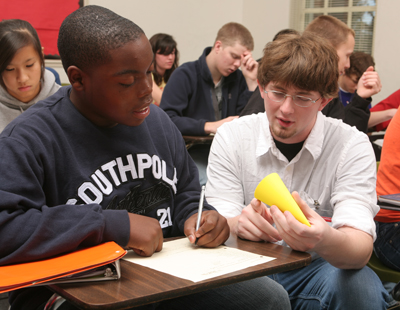
With help from the National Science Foundation, The Florida State University is helping to meet a pressing need that exists in Florida and throughout the United States.
The NSF has awarded Florida State’s innovative FSU-Teach program a five-year grant in the amount of $726,260 to develop new math and science teachers at the middle and high school levels. With the money — made available through the NSF’s Robert Noyce Teacher Scholarship Program — FSU-Teach will support students participating in the program as they gain experience teaching in "high-needs" schools.
"Our country is facing an educational crisis," said Joseph Travis, the dean of Florida State’s College of Arts & Sciences and leader of the team that received the Noyce grant. "We’re simply not doing a good enough job of providing young people — particularly students from low-income communities — with the skills they need to be successful in life and to keep our country economically competitive.
"Producing new teachers with strong backgrounds in science and mathematics is important in addressing this," Travis said, "but it is also critical that they also have strong skills teaching those subjects to students in ways that they can use — in the workplace and in their lives. The NSF funding will help us to develop those skills."
For years, U.S. students have fared poorly at math and science when compared to their peers in other countries. For example, in 2006 the Program for International Student Assessment found that American 15-year-olds ranked 24th out of 57 developed nations in science and 32nd in mathematics. The numbers are even more dire for high-needs students — those with economic, social or geographic disadvantages, who often lag far behind their fellow students. This so-called "achievement gap" is already costing the United States: Students who aren’t equipped with the educational tools to become scientists, mathematicians and engineers can’t help provide the technological advances upon which the nation’s economy has come to depend.
"We must recognize that when not all students are taught science and mathematics in ways that allow them to learn and excel, we all lose," said Sherry Southerland, co-director of FSU-Teach and a member of the grant team. "FSU-Teach students who receive the Noyce scholarships will be well prepared to effectively teach the students who need it most. What could be more important?"
A key problem is that not nearly enough math and science teachers are being produced to address our state’s or the nation’s needs, and "those that we do produce don’t remain in the teaching profession long enough," said Ellen Granger, also co-director of FSU-Teach and another member of the grant team. "Programs with demonstrated success are essential in helping us to engage more college students in teaching who otherwise might not consider it as a profession, and prepare them so they are effective in the classroom and stay in teaching. FSU-Teach is such a program."
Modeled on a groundbreaking program first established at the University of Texas at Austin, FSU-Teach was created specifically as a means of offering this teaching opportunity to college students who already have an interest and ability in math, science or engineering. At Florida State, the NSF Noyce grant will enable FSU-Teach to provide 42 scholarships, at $12,000 each, to students in the program, as well as 48 summer internships that will allow students to work in science- and math-related summer camps attended by children ranging from kindergarten through 12th grade to try out teaching in an informal setting.
"FSU-Teach provides a wonderful opportunity for our students to gain experience in two academic areas," said Robin Smith, the associate director of FSU-Teach. "Math and science majors are able to add a second major in math or science teaching while still graduating in four years — a great option for them. When they graduate, they’ll be certified to teach in Florida — and will have an excellent chance of getting a job right out of college. The Noyce funds will enhance this program."
While still relatively new, FSU-Teach is already catching on with Florida State’s students. Ninety-three new students began the first year of the program this semester.
"We hope the program will continue to grow to accommodate more students in the future," Granger said.
In addition to Travis, Granger and Southerland, other Florida State faculty members charged with administering the NSF grant are Victor Sampson and Kathleen Clark, both assistant professors involved in the FSU-Teach program and the School of Teacher Education.




